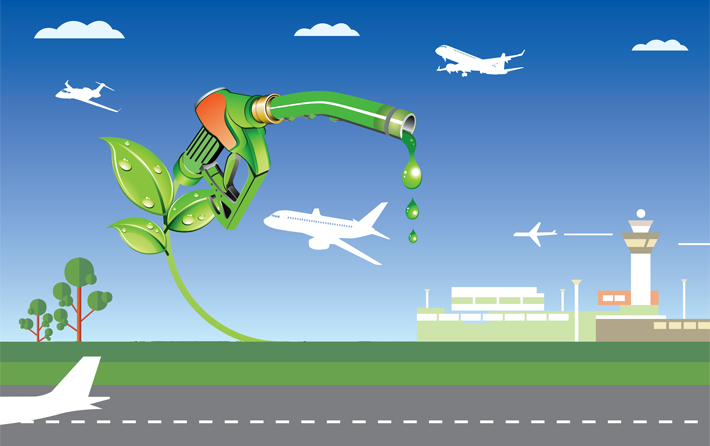Have you ever marveled at the miracle of flight? While air travel has made our world wonderfully small, there’s a hidden price – our planet’s health. Enter Sustainable Aviation Fuel (SAF). It’s more than just a buzzword; it’s a genuine green hope for our skies. Let’s dive into why this fuel could be a game-changer.
1. What’s the Deal with SAF?
Imagine fueling planes with waste oils, leftover crops, or even waste gases! That’s SAF for you. Unlike the regular stuff which is made from crude oil, SAF comes from renewable, diverse sources, making it pretty cool and environmentally-friendly.
2. A Breath of Fresh Air: Reduced Emissions
The magic of SAF is that it can potentially slash greenhouse gas emissions. Some studies suggest a whopping 80% less emission than regular jet fuel. What’s not to love about that?
2.1 Making Skies Friendlier
The aviation world is buzzing with a goal: no more increase in carbon emissions from 2020. SAF is the secret sauce to make this happen.
2.2 Fly Further, Emit Less
Here’s some geeky stuff: SAF has a higher energy density. In simple terms? Planes might fly further with the same amount of fuel. Less refueling = less carbon. Neat, right?
3. The Many Faces of SAF
One of the coolest things about SAF is that it doesn’t depend on just one source. Today it’s waste oil, tomorrow it could be something else. This means we aren’t putting all our eggs (or planes) in one basket.
3.1 From Trash to Thrust
Many sources for SAF, like waste oils or old crops, are basically trash. Turning garbage into jet fuel? Now that’s recycling on steroids!
3.2 No More Food vs. Fuel
Remember the drama about biofuels eating into our food supply? SAF sidesteps this issue by mostly using non-food resources. So, we can have our cake and eat it too.
4. Give a Nod to Nature
Done right, SAF could be a superhero for our environment. It stands up against the often harmful ways we extract fossil fuels. Plus:
4.1 Green Badges and Standards
There are some strict rules for making SAF. These guidelines ensure we aren’t chopping down forests carelessly or wasting precious resources.
5. More Green, More Jobs
Beyond just being kind to nature, SAF has another bonus: jobs. Think about all the research, farming, and production gigs that could come up! Local economies could get a sweet boost.
6. The Journey Ahead
Sure, SAF sounds dreamy, but there are bumps in the road. Matching the massive demand, ensuring top-notch quality, and keeping prices reasonable are challenges we need to tackle. But with some brainy innovations and the right support, SAF’s future looks bright.
7. Innovations on the Horizon
The world of SAF isn’t stagnant. Every day, there are bright minds tinkering in labs, experimenting in fields, and brainstorming in boardrooms, all focused on enhancing the potential of SAF.
7.1 Customizable Fuel Blends
In the spirit of innovation, researchers are constantly exploring new blends that combine various feedstocks. The goal? Crafting a cocktail that’s both efficient for engines and gentle on our environment.
7.2 Expanding Feedstock Sources
From algae to atmospheric carbon capture, the potential sources for SAF are growing. Tomorrow’s jet fuel could come from the most unexpected places, pushing the boundaries of what we traditionally see as ‘fuel.’
8. Global Partnerships: A Collective Leap
The race to SAF isn’t a solo flight. It’s a global relay, with countries, corporations, and communities passing the baton. By pooling resources, sharing research, and setting common goals, the aviation sector is collectively striving for a greener finish line.
8.1 SAF in the Developing World
Emerging economies, with their vast agricultural potential and rapid industrial growth, have a unique role. They can leapfrog over older, dirtier technologies directly into sustainable solutions, becoming key players in the SAF story.
9. Navigating the Turbulence
All innovations face headwinds, and SAF is no exception. Skeptics question its scalability and worry about costs. But history shows us that with time, even the most groundbreaking solutions become commonplace. Think of how solar panels, once a novelty, are now a neighborhood staple.
9.1 Grassroots Movements
It’s not just about the big players. Local communities and grassroots organizations are pushing for SAF adoption, advocating for cleaner skies, and ensuring that the voice of the everyday citizen is heard in the high-flying corridors of aviation.
10. Setting Our Sights High
So, where do we go from here? Forward, with optimism. Every gallon of SAF used is a promise to future generations. It’s a commitment that the wondrous act of flight, which brings us closer together as a global community, is done with care for our shared home.
Closing Thoughts
Next time you’re on a plane, looking out of the window at the world below, remember this: the journey to greener skies has already begun. It’s a collective effort, with each of us playing a part. From scientists to travelers, everyone has a stake in this uplifting story. Here’s to a future of flight that celebrates not just human achievement, but also our profound love for the planet.








